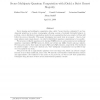93 search results - page 15 / 19 » Propagation of trust and distrust |
FOCS
2006
IEEE
14 years 3 months ago
2006
IEEE
Secret sharing and multiparty computation (also called “secure function evaluation”) are fundamental primitives in modern cryptography, allowing a group of mutually distrustfu...
AISC
1998
Springer
14 years 1 months ago
1998
Springer
The use of computer algebra is usually considered beneficial for mechanised reasoning in mathematical domains. We present a case study, in the application domain of coding theory, ...
JOC
2007
13 years 9 months ago
2007
In the setting of secure multiparty computation, a set of mutually distrustful parties wish to securely compute some joint function of their inputs. In the stand-alone case, it ha...
IWCMC
2009
ACM
14 years 4 months ago
2009
ACM
This paper proposes a dynamic trust establishment protocol that enables the nodes of an ad hoc network to establish security associations among each other in a distributed and pee...
ATAL
2007
Springer
14 years 3 months ago
2007
Springer
In this paper we develop a novel probabilistic model of computational trust that explicitly deals with correlated multi-dimensional contracts. Our starting point is to consider an...

